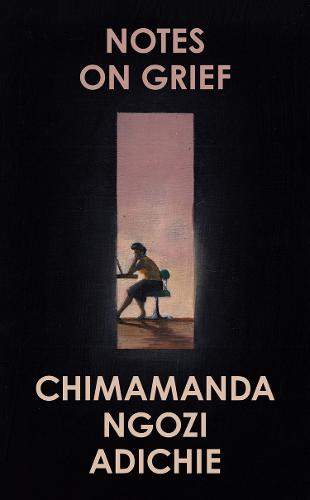Chimamanda Ngozi Adichie’s Notes on Grief captures the bewildering messiness of loss – review
Undoing the knots of grief that tie up her life following her beloved father’s death, Adiche’s meditation on loss is eloquent, searing and honest

“I am writing about my father in the past tense, and I cannot believe I am writing about my father in the past tense.”
Perhaps the defining line of Chimamanda Ngozi Adichie’s elegantly spare Notes on Grief is its last. This is not a spoiler. The premise of the slim 96-page volume is the “malicious surprise” of the death of her father, Professor James Nwoye Adichie, in the summer of 2020. It explores the brutality of those first desperate moments of grief, this “cruel kind of education” in this unasked-for new life.
Each of its 30 short sections reads like a stream of consciousness, scribbled randomly in notebooks and on the backs of envelopes, trying to make sense of the nonsensical. With raw eloquence, Adichie’s observations have, simultaneously, an academic detachment and an inescapable anguish at being “in the centre of this churning” with “porous edges that there is no way through”.
Though brief, Notes on Grief is, at times, a remarkably but necessarily uncomfortable read, because existing inside of that churning is inherently uncomfortable, unbearable. Written and published less than a year after her father’s death, Adichie’s pain on these pages is so palpable that one can almost taste its bitterness. (In a devastating pre-publication footnote not included in the text, Adichie’s mother, Grace, passed away this March, months after her husband, on his birthday.)
Adichie captures the bewildering messiness of loss in a society that requires serenity, when you’d rather just scream until someone explains that this has all been a horrible mistake. “My anger scares me, my fear scares me, and somewhere in there is shame, too – why am I so enraged and so scared?” she writes.
This is not fanciful language, because those grieving have no energy for fancy, even as the world insists on existing with all of its banalities
Her rage manifests itself notably when well-meaning mourners make things worse, sometimes just with their presence, which is proof that there’s something to mourn. Neither they nor death will go away, and propriety doesn't allow for tossing these nice people out on their ears (while keeping their condolence desserts).
Even the act of writing comforting words in a condolence guest book inspires ire: “I think, ‘Go home! Why are you coming to our house to write in that alien notebook? How dare you make this thing true?’” Adichie writes. “Somehow, these well-wishers have become complicit.”
These are not polite thoughts. That is because grief is impolite, and, as Adichie puts it, “substantial, oppressive, a thing opaque”. Her words put a welcome, authentic voice to this most universal of emotions, which is also one of the most universally avoided.
That unwanted conversation is more prescient in this Covid-stricken world. Adichie's father died of complications from kidney failure, but coronavirus looms grimly over Notes on Grief. It compounds grief's already claustrophobic nature by adding the traumatising physical distance of lockdowns and travel restrictions, preventing Adichie from immediately joining the rest of her family in Nigeria.
This leaves her assisting with the funeral planning and navigation of Igbo burial requirements via Zoom, which becomes a surprise lead character in Notes on Grief. The book begins with the family lovingly teasing each other on a regularly scheduled video call, separated by screens and continents. Adichie last sees her father alive on one of these calls, but by the next Zoom session, he is lying in the hospital, lifeless but “beautiful in repose”.

“I came undone,” Adichie writes, with sledgehammer simplicity. This is not fanciful language, because those grieving have no energy for fancy, even as the world insists on existing with all of its banalities. “I am filled with disbelieving astonishment that the mailman comes as usual,” she ponders. “How is it that the world keeps going, breathing in and out unchanged, while in my soul there is a permanent scattering?”
Notes on Grief is both achingly personal and stunningly familiar to anyone who has felt that scattering. Some passages might seem redundant, but so is grief, so viciously efficient in its elasticity.
Even Adichie’s memories of her father are simultaneously comforting and painful. The last part of the book becomes a sweet recounting of their bond, strengthened by a shared love, pride of culture, academic appreciation and even a signature laugh. “I not only adored him in that classic manner of a daddy’s girl, but I also liked him so much. I like him,” she writes, again vacillating between the realities of the time before and after her loss.
Ultimately, Adichie’s words crystallise our weird social insistence that there must be some point to loss, as if this will make things easier. “I want there to be a point, even if I do not know, for now, what that point is,” she writes.
The point of her loss is never settled – that brutally frank final line betrays an extended and possibly eternal disbelief. But the point of Notes on Grief seems to be that loss becomes something we must live with, if we indeed want to continue living. Her beloved father is both past tense and vividly present, and coming to terms with that is a tribute to the love that makes us grieve someone's loss in the first place.
Notes on Grief by Chimamanda Ngozi Adichie. HarperCollins, £10
© The Washington Post
Join our commenting forum
Join thought-provoking conversations, follow other Independent readers and see their replies
0Comments